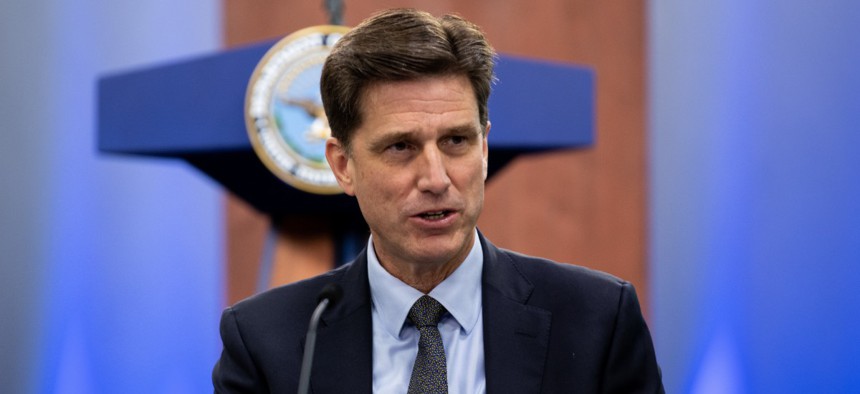Pentagon Tech Chief Defends Integrity of JEDI Award

Defense Department CIO Dana Deasy Andrew Carroll/Defense Department
The White House had no sway over the $10 billion JEDI cloud computing contract that the Defense Department awarded Microsoft, according to Chief Information Officer Dana Deasy.
The Defense Department took multiple steps to ensure the selection process for its massive JEDI cloud contract wasn’t influenced by President Trump’s personal politics or other outsiders, according to the Pentagon’s tech chief.
On Tuesday, the department’s acting Chief Information Officer Dana Deasy defended the decision to award the Joint Enterprise Defense Infrastructure contract to Microsoft over rival Amazon, which most experts expected to win the award. During his Senate confirmation hearing, Deasy received several questions related to the JEDI contract—which would be worth up to $10 billion over 10 years—including whether the Trump administration’s political agenda played any role in the decision.
“I feel very confident that at no time were team members that actually took the source selection … influenced with any external [organizations], including the White House,” Deasy said during an exchange with Sen. Angus King, I-Maine. It was those individuals who ultimately decided to award the contract to Microsoft, he said.
In the days since the award, some suggested the selection process was improperly swayed by the president’s personal animosity toward Amazon founder and CEO Jeff Bezos. In July, the president publicly questioned the competition process and called on Defense Secretary Mark Esper to review the program, and last year he allegedly told then-Defense Secretary James Mattis to “screw” Amazon.
Speaking before the Senate Armed Services Committee, Deasy said the Pentagon actively worked to shield people involved in the vendor selection process from outside influence. The roughly 50 members of the committee were divided into smaller teams that had no knowledge of each other’s activities, he said, and the identities of those members were kept anonymous throughout the process.
In an exchange with Ranking Member Jack Reed, D-R.I., Deasy also noted he never shared “proprietary source information” or his decision-making process with the department’s secretary or deputy secretary, who are both political appointees. He added that “to the best of [his] knowledge,” no members of the White House ever contacted any members of the source selection team.
During the hearing, lawmakers also grilled Deasy on the steps the Pentagon is taking to secure the JEDI cloud, which will simultaneously house unclassified, secret and top secret information. Since the start of the program, he said, Pentagon officials worked with the CIA and National Security Agency to ensure the platform would be structured in a way to ensure data remained “secured, segregated and protected.” The NSA will also perform penetration testing throughout the platform’s deployment to ensure any vulnerabilities are addressed, according to Deasy.
The JEDI contract is meant to streamline operations across the Pentagon by creating a single data platform for every component to use, a vast improvement over the clunky, inefficient web of clouds and networks the department currently uses. During the hearing, Deasy said enterprise cloud will lay the foundation for all of the military’s other tech priorities, including artificial intelligence, enhanced cybersecurity and next-generation command, control and communications.
Still, JEDI won’t do away with the department’s other cloud platforms. The Pentagon will continue to rely on “a multitude of clouds” to provide different capabilities, Deasy said, but JEDI will offer a mechanism for stringing its various information platforms together.
In a separate speech on Tuesday, Peter Ranks, the Pentagon’s deputy CIO for information enterprise, said the department’s cloud deployment efforts remain “disjointed,” and officials must adopt a more scalable approach to reap the technology’s full benefits.
“We haven’t figured out ... what is the right [way] to build applications out of the elements that the cloud provider gives you,” Ranks said at a conference hosted by the Professional Services Council. “We haven’t figured out a [enterprise]wide way to adapt our accreditation and security processes to match the speed with which we can build things in the cloud.”
During the hearing, Deasy also touched on some of the department’s other tech priorities beyond JEDI.
Military leaders remain intent on expanding artificial intelligence capabilities through initiatives like the Joint Artificial Intelligence Center, he said, though those efforts must “continue to move with more urgency” to keep a leg up on global competitors like China. He also underscored the need to reform the procurement process to ensure vendors place a premium on cybersecurity.
“We have to move away from this self-assessment approach that our suppliers do today and we have to move to an independent assessment approach,” he said. The Pentagon is currently creating standing up such a process through the Cybersecurity Maturity Model Certification, which is expected to be up and running by summer 2020.
Additional reporting by Aaron Boyd.





